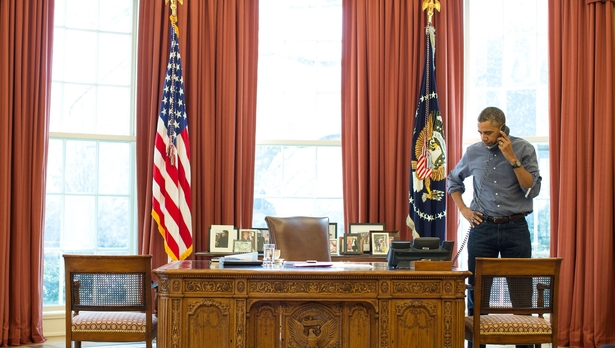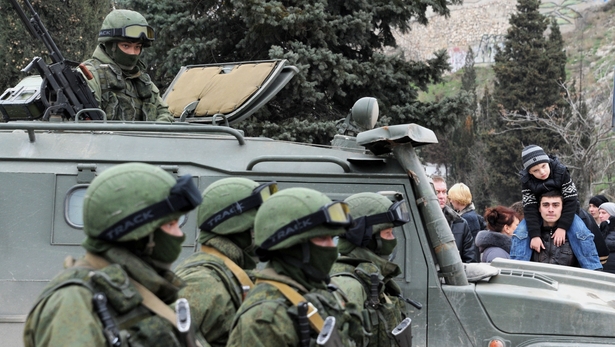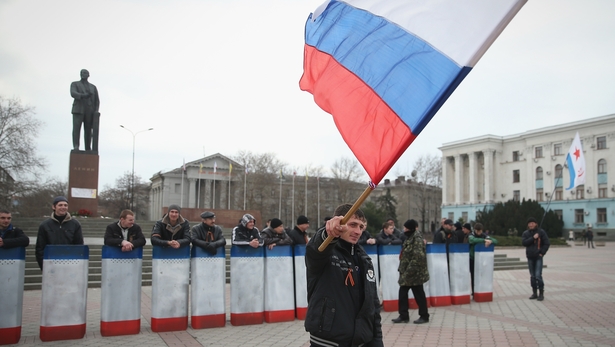 Sunday 02 March 2014 15.31
Sunday 02 March 2014 15.31 Ukraine has mobilised for war and called up its reserves, after Russian President Vladimir Putin threatened to invade in the biggest confrontation between Moscow and the West since the Cold War.
Ukraine's security council ordered the general staff to immediately put all armed forces on highest alert, the council's secretary Andriy Parubiy announced.
The Defence Ministry was ordered to conduct the call-up, potentially of all men up to 40 in a country that still has universal male conscription.
Russian forces who have already seized Crimea, an isolated Black Sea peninsula where most of the population are ethnic Russian, tried to disarm the small Ukrainian contingents there.
Some Ukrainian commanders refused to give up weapons and bases were surrounded.
Of potentially even greater concern are eastern swathes of the country, where most ethnic Ukrainians speak Russian as a native language.
Those areas saw violent protests, with pro-Moscow demonstrators hoisting flags at government buildings and calling for Russia to defend them.
President Putin's declaration that he has the right to invade his neighbour, for which he quickly received the unanimous approval of his parliament, brought the prospect of war to a country of 46 million people on the ramparts of central Europe.
The Association of Ukrainians in the Republic of Ireland said 200 people have taken part in a demonstration at the Russian Embassy in Rathgar, Dublin.
A second protest is also under way at European Union House on Dawson Street.

"President Obama expressed his deep concern over Russia's clear violation of Ukrainian sovereignty and territorial integrity, which is a breach of international law," the White House said after the leaders spoke for 90 minutes on Saturday.
Ukrainian Prime Minister Arseny Yatseniuk, leading a pro-European government that took power after Moscow ally Viktor Yanukovych fled a week ago, said Russian armed action "would be the beginning of war and the end of any relations between Ukraine and Russia".
Foreign Minister Andriy Deshchytsya said he sent a request to NATO to "examine all possibilities to protect the territorial integrity and sovereignty of Ukraine."
Ukraine also appealed for help to Britain and the United States, as co-signatories with Moscow to a 1994 accord guaranteeing Ukraine's security after the breakup of the Soviet Union.
NATO ambassadors are due to meet in Brussels today.
Washington has proposed sending monitors to Ukraine under the flags of the United Nations or Organisation for Security and Cooperation in Europe, bodies where Moscow would have a veto.
Washington and its allies have suspended plans to attend a G8 summit in Sochi, where Mr Putin had just finished staging his $50bn winter Olympic games.
In Crimea, Ukraine's tiny military contingent was powerless to oppose Russian forces, who bore no insignia on their uniforms but drove vehicles with Russian plates and seized government buildings, airports and other locations in the past three days.
Elsewhere on the occupied peninsula, the Russian forces appeared to be assuming a lower profile after the pro-Moscow Crimean leader announced overnight that the situation was now "normalised".
Russians had vanished from outside a small Ukrainian guard post in the port of Balaclava that they had surrounded with armoured vehicles on Saturday.

The Russian forces had been greeted cheerfully by many, with a wedding party honking its horns and people snapping photos. But there were also some voices of worry.
"No one is attacking us, so why do we need protection – much less armed protection? They are filling up Balaclava with troops," said Olga Karpova, 32.
Russian officials have repeatedly described Ukraine's Russian speakers, some of whom have Russian passports, as facing urgent danger. Itar-Tass quoted Russian border guards assaying 675,000 people had fled Ukraine for Russia in the past two months and there were signs of a "humanitarian catastrophe".
In a statement posted online, the Kremlin said that Mr Putin had told Mr Obama "there are real threats to the life and health of Russian citizens and compatriots on Ukrainian territory".
Moscow reserved the right to intervene on behalf of Russian speakers anywhere they were threatened, he added.
So far there has been no sign of Russian military action in Ukraine outside Crimea, the only part of the country with a majority that is ethnically Russian and which has often voiced separatist aims at times of tension between Moscow and Kiev.
A bigger risk would be conflict spreading to the rest of Ukraine, where the sides could not be easily kept apart.

Demonstrators flew Russian flags at government buildings in the cities of Kharkiv, Donetsk, Odessa and Dnipropetrovsk.
The worst violence took place in Kharkiv, where scores of people were wounded when thousands of pro-Russian activists, some brandishing axe handles and chains, stormed the regional government headquarters and fought pitched battles with a smaller number of supporters of Ukraine's new authorities.
The United Nations Security Council met in emergency session to discuss the crisis.
Secretary General Ban Ki-Moon spoke to President Putin by phone urging him to have direct talks with Kiev.
Elsewhere, Canada has recalled its ambassador to Russia and said it is also freezing preparations to take part in the G8 Summit.
NATO ambassadors are due to meet in Brussels today to discuss the crisis.
Anda sedang membaca artikel tentang
Ukraine mobilises for war with Russia
Dengan url
http://newsdeadlineup.blogspot.com/2014/03/ukraine-mobilises-for-war-with-russia.html
Anda boleh menyebar luaskannya atau mengcopy paste-nya
Ukraine mobilises for war with Russia
namun jangan lupa untuk meletakkan link
Ukraine mobilises for war with Russia
sebagai sumbernya
0 komentar:
Posting Komentar